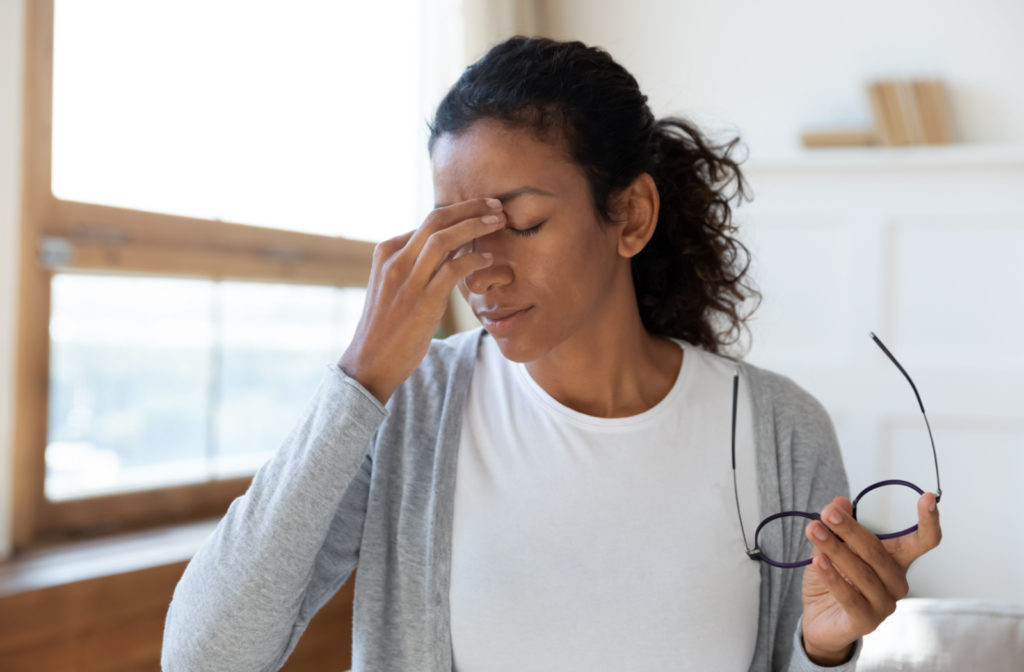If you’ve ever experienced dry eyes, you already know how unpleasant the symptoms can be. And it’s common for many to experience headaches combined with other dry eye symptoms. While more research is needed to determine how exactly dry eyes and headaches are linked, there does seem to be a connection between them.
Fortunately, many treatment options are available to help individuals find lasting relief from dry eye symptoms and, in some cases, headaches.
What Is Dry Eye Disease?
Dry eye disease is a common eye condition impacting an estimated 6 million Canadians.
Tears are essential in keeping your eyes lubricated, comfortable, and healthy. When there’s a problem with the quantity or quality of your tears, your eyes can become dry and irritated.
There are 2 types of dry eye disease:
- Aqueous deficiency dry eye occurs when your tear glands don’t produce enough tears. Dry eyes caused by aqueous deficiency may be caused by certain medications or underlying health conditions, such as Sjögren’s disease.
- Evaporative dry eye occurs when an imbalance in your tear production causes your tears to evaporate more quickly than normal. The most common cause of evaporative dry eye is meibomian gland dysfunction (MGD). MGD interferes with your eye’s ability to produce oils, which are essential for healthy tear production.
Additional causes of dry eyes include environmental factors, such as dry, smoky, or dusty surroundings or spending prolonged periods working at a computer screen.
Dry Eye Symptoms
Not everyone experiences the same dry eye symptoms. Depending on the severity and underlying cause of the condition, dry eyes have various uncomfortable symptoms, including:
- Burning or stinging eyes
- Scratchiness
- Foreign body sensation
- Redness
- Excessive tearing
- Light sensitivity
- Blurred vision
The Relationship Between Dry Eyes & Headaches
While the exact connection between dry eyes and headaches is unknown, research suggests dry eyes can influence the severity and symptoms of migraine headaches. Additionally, those who experience migraines are at higher risk of being diagnosed with dry eyes.
Dry eyes and headaches also share some common triggers and symptoms. Eye strain, hormonal changes, and dehydration are all factors that can contribute to both dry eyes and headaches. Both conditions also share symptoms such as a sensitivity to light and blurred vision.

Finding Relief from Dry Eyes & Headaches
In most cases, dry eyes and headaches will need to be treated separately. However, if your dry eyes and headaches are caused by common triggers, removing that trigger can provide relief from both. This may include reducing screen time to prevent digital eye strain (a common cause of dry eyes and headaches).
If you experience persistent dry eyes and headaches, talk with your eye doctor. They can help identify the specific causes of your dry eyes and recommend appropriate treatments.
Some strategies for dry eye relief include:
- Eye drops: Over-the-counter eye drops, also called artificial tears, can help lubricate your eyes and relieve dryness. Eye drops come in various formulations, including contact lens-friendly and preservative-free options.
- Warm compress: Applying a warm compress to your closed eyes can help stimulate and remove blockages in your meibomian glands, restoring proper tear production.
- Blink regularly: During intense visual tasks, such as prolonged screen time, remind yourself to blink regularly. Blinking helps spread tears across the surface of your eye and prevents them from evaporating too quickly.
- Adjust your environment: If you spend a lot of time in front of a screen, use proper lighting, reduce glare, and take regular breaks to rest your eyes.
- Add a humidifier: Use a humidifier to add moisture to the air in your home or workplace, especially during dry seasons.
- Prioritize omega-3 fatty acids: Some studies suggest that omega-3 fatty acids may help improve tear production and alleviate dry eye symptoms. Omega-3 fatty acids can be found in food like fatty fish like mackerel, salmon, and sardines or as a dietary supplement.
- Stay hydrated: Drinking plenty of water is essential for maintaining overall hydration, which can also benefit your eyes.
When At-Home Treatment Isn’t Enough
You may benefit from a combination of treatments for more severe cases of dry eye. Many eye doctors now offer in-office dry eye treatment options that target the underlying cause of dry eyes to provide long-term relief.
Your Partner in Dry Eye Therapy & Diagnosis
At Headwaters Optometry, we proudly offer our patients comprehensive eye care that includes dry eye diagnosis and treatment. Contact our team to book a consultation and learn how we can help you find lasting relief from uncomfortable dry eye symptoms.




